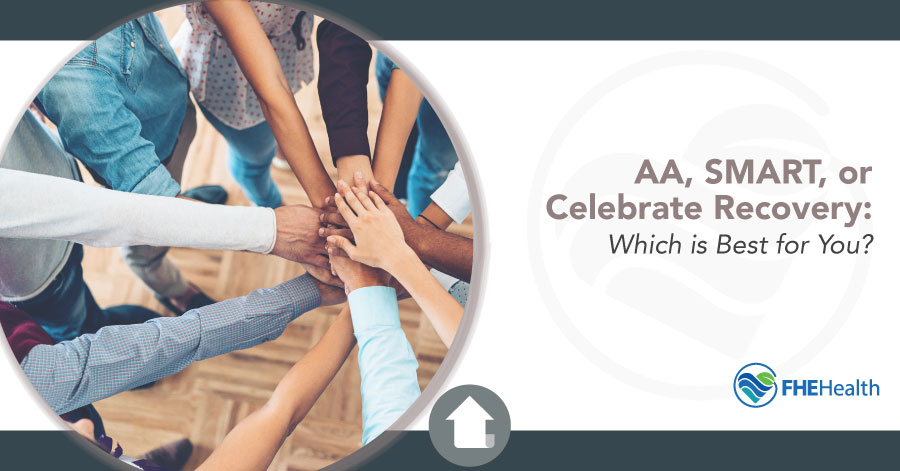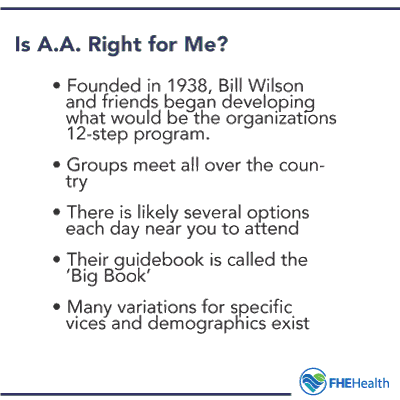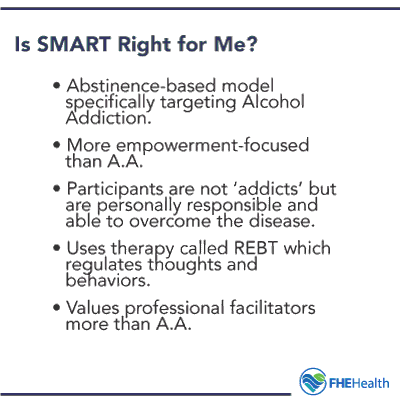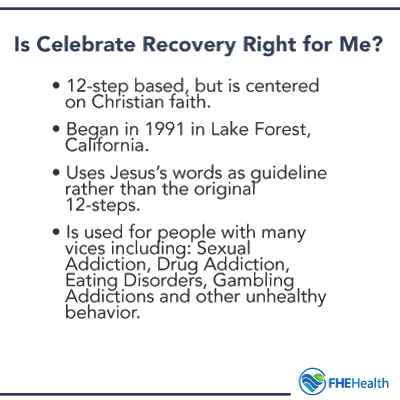
Admitting you have an addiction is the first step to the path to recovery. The next step should be a quality detox (if necessary) and residential program to set the foundation for your new life. After the formal treatment plans, you have some options about your continuing support network. There are several treatment options that utilize different philosophies that you can use, moving forward. Three of the most popular philosophies out there regarding addiction treatment are Alcoholics Anonymous, SMART, and Celebrate Recovery. Each of these options has some very important similarities and differences you should know before choosing which treatment method is right for you. It is very likely that you will have some experience with these formats in an inpatient center, and will be able to discern what is most effective (not what is easiest!) for you. Let’s take a look at each of these treatment options.
Alcoholics Anonymous
 In 1938 the founder of Alcoholics Anonymous Bill Wilson began developing what would become the organization’s 12-Step Program. He wrote it down in a guidebook for those not physically capable of attending AA meetings called the Big Book. Since its inception, the program has been adopted in a number of variations by almost three-quarters of treatment centers.
In 1938 the founder of Alcoholics Anonymous Bill Wilson began developing what would become the organization’s 12-Step Program. He wrote it down in a guidebook for those not physically capable of attending AA meetings called the Big Book. Since its inception, the program has been adopted in a number of variations by almost three-quarters of treatment centers.
As described by Alcoholics Anonymous and the Big Book, the twelve steps are:
- Admit you are powerlessness over the addiction
- Believe there is a higher power that can help
- Decide to relinquish control to that higher power
- Take a personal inventory of oneself
- Admit to oneself, another individual, and higher power what wrongdoing has been done
- Be ready for the higher power to come in and correct any of your shortcomings
- Ask the higher power to get rid of those shortcomings
- Make a list of wrongdoings and be willing to make amends to yourself and others
- Contact those who have been hurt, unless that would further harm them
- Continue to record a personal inventory and admit when you make other mistakes
- Use prayer and meditation to seek enlightenment and connection with a higher power
- Carry forth the message of the 12-Step Program to people who need help
The 12-steps approach is a viable treatment option because it empowers addicts to admit their addiction and get help. It makes them more aware and observant of their unhealthy behaviors so they know exactly how to change their actions. AA is conducted in groups, which allows addicts to meet others who are struggling so that they know they are not alone. The steps encourage all those involved to share their stories, not be ashamed, and to have compassion and empathy for everyone else. Many are paired with a sponsor who encourages them to keep continuing treatment. However, some take issue with the religious element of the 12-Steps since they either are not Christian or do not believe in God at all. There is also conflict over the very first step of the program, as many people do not want to view themselves as powerless over their addiction.
AA Success Rate
A study reported mixed results for AA’s success rate. However, for some attendees, their odds of staying sober increased by 6.9.
SMART Recovery
 SMART Recovery like Alcoholics Anonymous is abstinence-based, requiring that all those involved completely give up abusing substances. It is also designed specifically to target alcohol addiction but is not as popular as AA. However, SMART Recovery is different from AA in its approach to titles. No one participating will be labeled an “addict”, “alcoholic”, or “diseased”. This program does not believe you are powerless over your addiction and religion and spirituality are not needed to recover from substance abuse. It is common-sense based, built to empower the individual and make them more personally accountable for their disease rather than trusting in God or relying on people in a group to look after them and their habits.
SMART Recovery like Alcoholics Anonymous is abstinence-based, requiring that all those involved completely give up abusing substances. It is also designed specifically to target alcohol addiction but is not as popular as AA. However, SMART Recovery is different from AA in its approach to titles. No one participating will be labeled an “addict”, “alcoholic”, or “diseased”. This program does not believe you are powerless over your addiction and religion and spirituality are not needed to recover from substance abuse. It is common-sense based, built to empower the individual and make them more personally accountable for their disease rather than trusting in God or relying on people in a group to look after them and their habits.
SMART Recovery also implements a medical feature absent in AA. It utilizes a form of cognitive-behavioral therapy called REBT or Rational Emotive Behavior Therapy. REBT holds that your mindset creates your feelings and influences your actions. By keeping your thoughts, emotions, and beliefs in check, one can empower oneself to quit alcohol. AA emphasizes speaking about your past and background while SMART Recovery is more concerned with present-day occurrences and the causes of self-destruction, as well as how to best correct them with the help of professional facilitators, another characteristic not found with Alcoholics Anonymous.
SMART Recovery Success Rate
SMART claims that according to a clinical trial, people who completed the program increased their sober days by 72% and experienced fewer harmful effects from their addiction.
Celebrate Recovery
 Celebrate Recovery, like Alcoholics Anonymous, is also a twelve-step program but is far more religiously grounded than both AA and SMART Recovery. It began in 1991 at Saddleback Church in Lake Forest, California and is based on the bible with Jesus Christ’s words used as a guideline. Another aspect of Celebrate Recovery is that is applicable to all form of addictions, rather than just alcohol addiction which is the focus of AA and SMART. People with sexual addiction, drug addiction, eating disorders, gambling addiction, or any unhealthy behavior can attend meetings.
Celebrate Recovery, like Alcoholics Anonymous, is also a twelve-step program but is far more religiously grounded than both AA and SMART Recovery. It began in 1991 at Saddleback Church in Lake Forest, California and is based on the bible with Jesus Christ’s words used as a guideline. Another aspect of Celebrate Recovery is that is applicable to all form of addictions, rather than just alcohol addiction which is the focus of AA and SMART. People with sexual addiction, drug addiction, eating disorders, gambling addiction, or any unhealthy behavior can attend meetings.
The twelve steps promoted by Celebrate Recovery are each paired with a bible verse:
- Admit we are powerless over our addictions and compulsive behaviors and that our lives have become unmanageable (Romans 7:18 NIV)
- We came to believe that a power greater than ourselves could restore us to sanity. (Philippians 2:13)
- We made a decision to turn our wills and our lives over to the care of God. (Romans 12:1)
- We made a searching and fearless moral inventory of ourselves (Lamentations 3:40)
- We admitted to God, to ourselves, and to another human being the exact nature of our wrongs. (James 5:16)
- We were entirely ready to have God remove all these defects of character. (James 4:10)
- We humbly asked Him to remove all our shortcomings. (1 John 1:9)
- We made a list of all persons we had harmed and became willing to make amends to them all. (Luke 6:31)
- We made direct amends to such people whenever possible, except when to do so would injure them or others. (Matthew 5:23-24)
- We continued to take personal inventory, and when we were wrong, promptly admitted it. (1 Corinthians 10:12)
- We sought through prayer and meditation to improve our conscious contact with God, praying only for knowledge of His will for us and the power to carry it out. (Colossians 3:16a)
- Having had a spiritual experience as a result of these steps, we tried to carry this message to others and to practice these principles in all our affairs. (Galatians 6:1)
Like AA, Celebrate Recovery takes place in group settings where people tell stories of their past and background. Attendants are given sponsors who will hold them accountable for maintaining complete abstinence from their addiction. As seen, Celebrate Recovery is a far more religious version of AA, even promoting the very first steps of AA that people are powerless over their addictions and must surrender to a higher power. However, Celebrate Recovery is strictly Christian, while AA can be modified and adapted by members of another faith, or even by atheists and agnostics.
What Are Your Other Options?
If none of these options suit you, look into Moderation Management. This program focuses on harm reduction instead of eliminating alcohol consumption altogether. Moderation Management offers meetings, therapists and an online community to help you drink less.
Alternatively, LifeRing aims to help you cut alcohol out of your life. However, LifeRing takes a secular approach that doesn’t expect you to believe in a higher power. This program offers books, in-person meetings, online meetings and a forum to connect you with other people in recovery. After staying sober for six months, you can host your own LifeRing meetings.
Treatment Options for You
FHE Health also provides various treatment options for our clients. Unlike other centers, we give them the opportunity to live on our sober living campus throughout every phase of rehabilitation, allowing for the best environment within which recovery can occur. With sober living, we teach a number of vital skills to patients so that they are able to function in the real world. They relearn how to interact socially, practice healthy living habits, plan their careers, etc.
One of our levels of care is medical detox, where we grant addicts in the first stages of recovery access to doctors, nurses, and therapists around the clock. Medical detox is usually for people who have just quit and need to have a safe place where they can undergo the sometimes painful and uncomfortable symptoms of withdrawal and drug cravings. We try to facilitate that process by individually working with each patient. We provide medication, that has been approved for treatment, to help lessen the intensity of withdrawal. Buprenorphine, methadone and naltrexone are some of the ones found to be useful at combating heroin and opiate addiction.
Immediately following the detoxification process, we have a residential treatment option where patients are allowed to completely concentrate on finding their identity in a safe and supportive environment free of triggers and life’s daily stressors. There are a number of wellness amenities, including nutrition services, a massage room, and gym. Clients are able to meet with our team of doctors, psychiatrists, and therapists weekly to be supervised and advised through treatment.
Start Your Journey Today
If you’re thinking about recovery, call FHE Health at (833) 596-3502 to discuss your options. You don’t have to make a decision today unless you’re ready. Learn about addiction and mental health treatment, and take the first steps toward reaching your goals. Our professionals are standing by 24/7.






